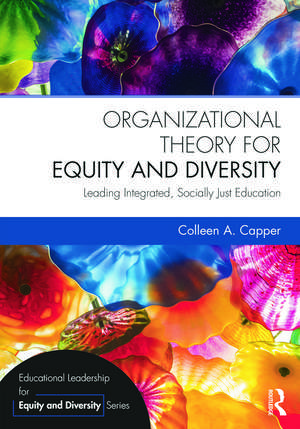Organizational Theory for Equity and Diversity: Leading Integrated, Socially Just Education: Educational Leadership for Equity and Diversity
Autor Colleen A. Capperen Limba Engleză Paperback – 5 noi 2018
Preț: 402.72 lei
Nou
Puncte Express: 604
Preț estimativ în valută:
77.08€ • 83.76$ • 64.79£
77.08€ • 83.76$ • 64.79£
Carte tipărită la comandă
Livrare economică 19 aprilie-03 mai
Preluare comenzi: 021 569.72.76
Specificații
ISBN-13: 9780415736220
ISBN-10: 0415736226
Pagini: 256
Ilustrații: 36
Dimensiuni: 178 x 254 x 20 mm
Greutate: 0.45 kg
Ediția:1
Editura: Taylor & Francis
Colecția Routledge
Seria Educational Leadership for Equity and Diversity
Locul publicării:Oxford, United Kingdom
ISBN-10: 0415736226
Pagini: 256
Ilustrații: 36
Dimensiuni: 178 x 254 x 20 mm
Greutate: 0.45 kg
Ediția:1
Editura: Taylor & Francis
Colecția Routledge
Seria Educational Leadership for Equity and Diversity
Locul publicării:Oxford, United Kingdom
Cuprins
Series Editor Introduction
Preface
Acknowledgements
Chapter 1 - Introduction and Epistemologies of Educational Leadership and Organizations
Chapter 2 – History of Organizational Theory and Equity in the Field
Chapter 3 – Structural Functional Epistemology
Chapter 4 – Interpretivist Epistemology
Chapter 5 – Critical Theory Epistemology
Chapter 6 – Feminist, Poststructural, and Feminist Poststructural Epistemologies
Chapter 7 – Critical Race Theory, Black Crit
Chapter 8 – LatCrit, Tribal Crit, and Asian Crit Theories
Chapter 9 – Black Feminism and Black Feminist Epistemology
Chapter 10- Disability Studies in Education Epistemology
Chapter 11 – Queer Theory
Chapter 12 - Individual and Organizational Identity Formation toward Social Justice
Preface
Acknowledgements
Chapter 1 - Introduction and Epistemologies of Educational Leadership and Organizations
Chapter 2 – History of Organizational Theory and Equity in the Field
Chapter 3 – Structural Functional Epistemology
Chapter 4 – Interpretivist Epistemology
Chapter 5 – Critical Theory Epistemology
Chapter 6 – Feminist, Poststructural, and Feminist Poststructural Epistemologies
Chapter 7 – Critical Race Theory, Black Crit
Chapter 8 – LatCrit, Tribal Crit, and Asian Crit Theories
Chapter 9 – Black Feminism and Black Feminist Epistemology
Chapter 10- Disability Studies in Education Epistemology
Chapter 11 – Queer Theory
Chapter 12 - Individual and Organizational Identity Formation toward Social Justice
Notă biografică
Colleen A. Capper is Professor of Educational Leadership and Policy Analysis at the University of Wisconsin-Madison, U.S.A.
Recenzii
"This book makes no apologies in justifying why we need to ground the teaching and research in organizational theory in educational administration in areas such as critical race theory, feminist epistemologies, Queer theories, Disability studies, etc. Capper truly embraces a sincerity of intersectionality, which will help students re-think what organizations mean and what they do. This book will push our field to once and for all move research and teaching away from the traditional frameworks, and toward the organizational realities of the lived experiences of the people in those organizations."
—Laurence Parker, Professor of Educational Leadership and Policy, University of Utah
"Instead of the typical manner of presenting organizational theories as topics such as structure, decision making, and leadership, Capper provides a unique analysis that makes so much more sense for the leadership development of educators. Using valuable teaching tools, she provides the opportunity for students (and instructors) to analyze their own identity development as they struggle with the claims of the various epistemologies regarding equity and diversity."
—Gary M. Crow, Professor Emeritus, Indiana University
"If you have ever wanted to critically interrogate the almost completely ’race- and culturally neutral‘ ways we think about and analyze organizations and organizational dynamics in schools, then this book is for you. I do not know of any other text that analyzes in such a thorough and truly useful fashion, while also acknowledging educational leadership’s history. This gem of a book includes rich dives into relevant epistemologies balanced against practical, pertinent, and quite useful case studies that speak to the current state of school leadership."
—Mark Anthony Gooden, Program Director and Christian A. Johnson Endeavor Professor of Education Leadership, Columbia University
—Laurence Parker, Professor of Educational Leadership and Policy, University of Utah
"Instead of the typical manner of presenting organizational theories as topics such as structure, decision making, and leadership, Capper provides a unique analysis that makes so much more sense for the leadership development of educators. Using valuable teaching tools, she provides the opportunity for students (and instructors) to analyze their own identity development as they struggle with the claims of the various epistemologies regarding equity and diversity."
—Gary M. Crow, Professor Emeritus, Indiana University
"If you have ever wanted to critically interrogate the almost completely ’race- and culturally neutral‘ ways we think about and analyze organizations and organizational dynamics in schools, then this book is for you. I do not know of any other text that analyzes in such a thorough and truly useful fashion, while also acknowledging educational leadership’s history. This gem of a book includes rich dives into relevant epistemologies balanced against practical, pertinent, and quite useful case studies that speak to the current state of school leadership."
—Mark Anthony Gooden, Program Director and Christian A. Johnson Endeavor Professor of Education Leadership, Columbia University
Descriere
Organizational Theory for Equity and Diversity covers the full range of organizational theories as applied to educational leadership practice and research, exploring not only traditional perspectives but also critically oriented epistemologies including Critical Race Theory; LatCrit, Asian, Tribal Crit, and Black Crit; disability studies theories; feminist theories; queer theories, and theories of intersectionality.


